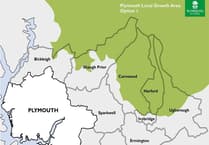Following Steve Peacock’s excellent piece on the proposed merger of South Hams District Council with West Devon Borough Council, I would like to add a couple of issues which are not dealt with in the consultation documentation, or the website.
Firstly, there are democratic consequences.
South Hams is about 60 per cent bigger than West Devon – but with the same number of councillors. At the moment a councillor in West Devon is – on average – representing about 1,700 people. In the South Hams that figure is 2,670.
The proposed new Council will have 48 councillors. Neither the consequences nor the mechanics of such a change have been mentioned. In any case there will be a need to radically change the ‘wards’ so that each one of the new 48 wards is inhabited by an average of 2,830 people.
However, it seems to me that it would be more fair, and democratically more rational, if the 48 seats were divided between the two existing council areas in such a way as to recognise that the South Hams has the 60 per cent of the members, ie 28, which its population justifies.
As an aside to the democracy argument, it seems strange that the new district council would be about 70 per cent larger than our parliamentary constituency.
Secondly, there are political consequences.
The economy of both the District Councils is predominantly a fluid mix of agriculture and tourism.
Tourists, particularly the summer variety, come down to the peninsula and in their pre-planning; they decide whether to turn off the M5/A38 and take the A30, or to stay on The Devon Expressway. South Hams DC has a vested interest in them staying with the A38. West Devon BC has an equally vested interest in them turning onto the A30.
In the unlikely event that the government should decide to spend money on our infrastructure, there will be terminal conflict of interest in the proposed new district council. The roads are one thing, but the route of any new railway link beyond Exeter would be a debate in the council chamber I would love to attend.
Incidentally, I cannot recall any mention of the proposed location of the new council chamber.
If it is to be either Totnes or Tavistock, then a projection of councillors’ travelling expenses would come down firmly on the side of Totnes.
There is clearly a debate to be had about the benefits, department by department, of the merger, but for the time being, and conscious of space, I am sticking with these two important areas.
Finally, I think the estimated cost of £3.5m for the execution of the proposed changes is woefully inadequate.
Michael Bailey
Brook Road, Ivybridge



Comments
This article has no comments yet. Be the first to leave a comment.